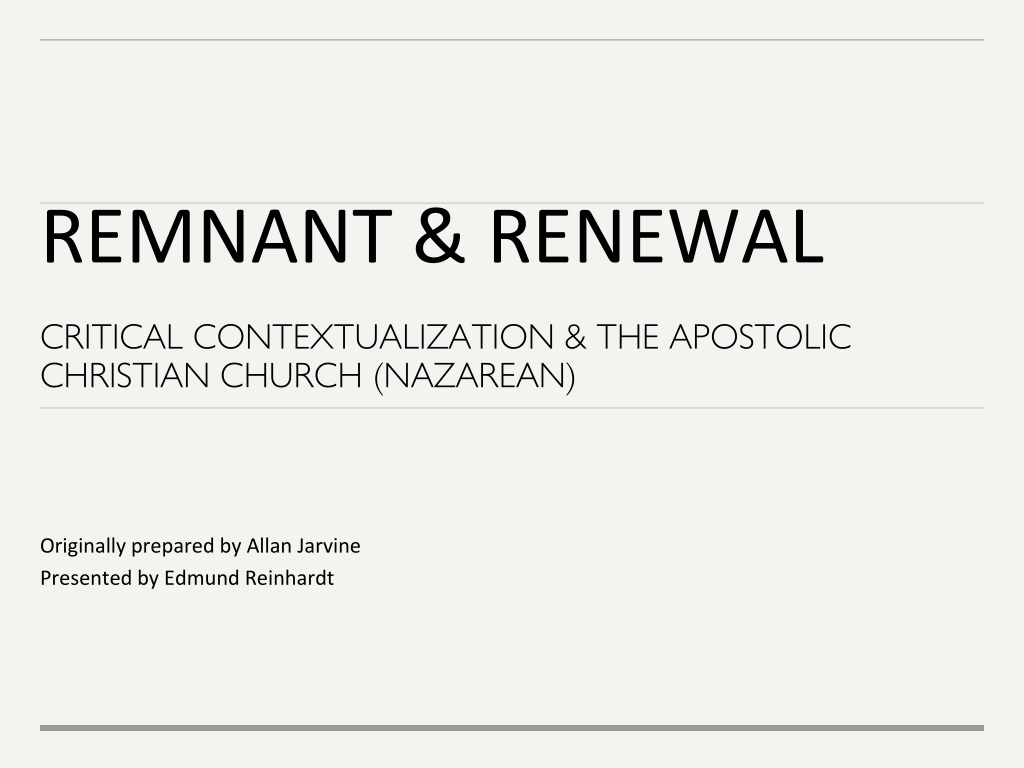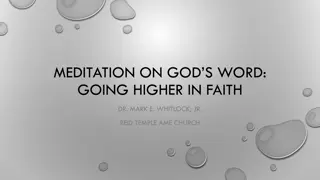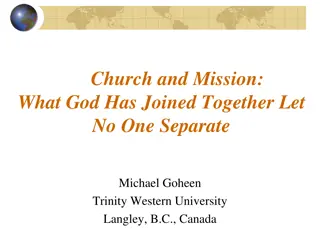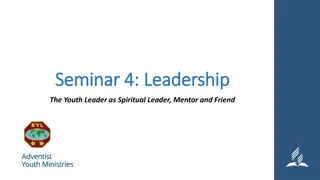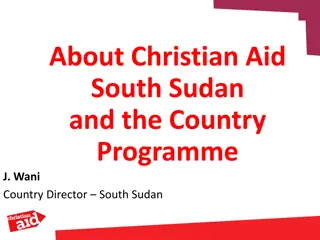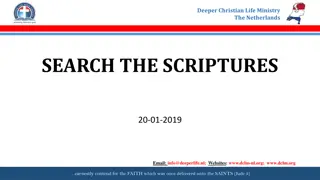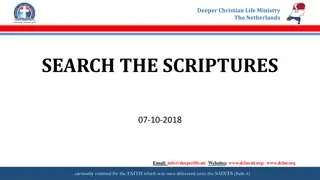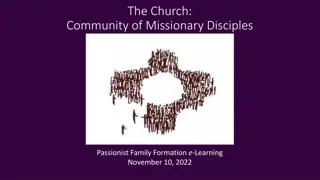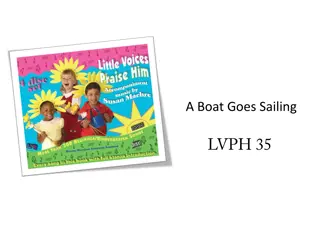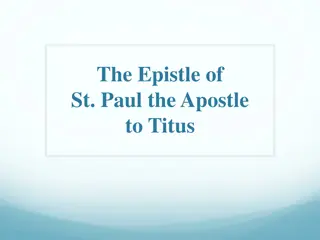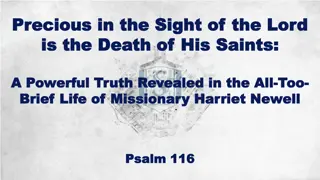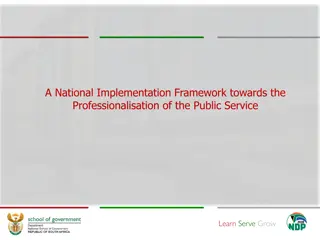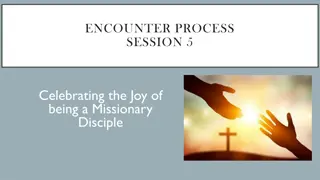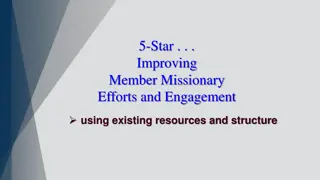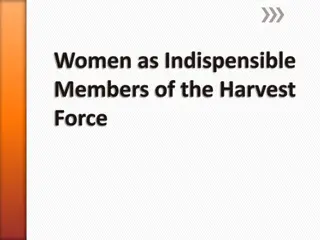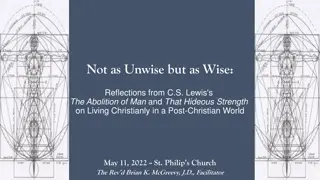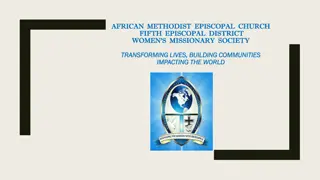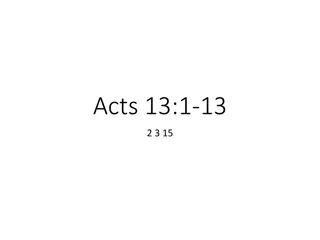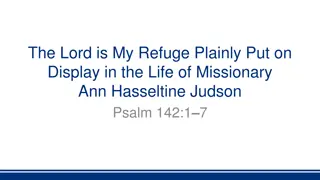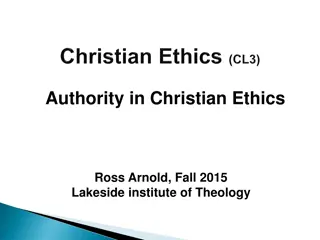Critical Contextualisation in Christian Missionary Activities
Contextualisation in missionary work involves relating the Gospel to various cultures, understanding the significance of cultural context, and avoiding uncritical approaches that ignore historical teachings. Critical contextualisation emphasizes the importance of exegesis and hermeneutics within the broader church community, ensuring a deeper connection with the Gospel and its implications for discipleship and church history.
Download Presentation

Please find below an Image/Link to download the presentation.
The content on the website is provided AS IS for your information and personal use only. It may not be sold, licensed, or shared on other websites without obtaining consent from the author. Download presentation by click this link. If you encounter any issues during the download, it is possible that the publisher has removed the file from their server.
E N D
Presentation Transcript
REMNANT & RENEWAL CRITICAL CONTEXTUALIZATION & THE APOSTOLIC CHRISTIAN CHURCH (NAZAREAN) Originally prepared by Allan Jarvine Presented by Edmund Reinhardt
PART I1 1. Contextualisation & Critical Contextualisation 2. Examples from the New Testament 3. What can we learn from this? 2
Contextualisation Definition Contextualization is concerned with how the Gospel and culture relate to one another across geographic space and down through time3 It captures in method and perspective the challenge of relating the Gospel to culture [e.g., Jewish to Greco-Roman, etc.]3 It attempts to communicate the Gospel in word and deed to establish the church in ways that make sense to people within their local cultural context, presenting Christianity in such a way that it meets people s deepest needs and penetrates their worldview, thus allowing them to follow Christ and remain within their culture [e.g., the church at Corinth]3 Non-contextualised Christianity seldom engages people at the level of their deepest needs3 3
Critical Contextualisation Non-contextualisation & Uncritical Contextualisation Non-contextualisation: the [early, Protestant] missionary doctrine that there is nothing in the non- Christian culture on which the Christian missionary can build and, therefore, every aspect of the traditional non-Christian culture had to be destroyed before Christianity could be built up 6 Offends people for the wrong reasons3 Uncritical contextualisation: Denial of absolutes and of truth 6 Reduces the gospel to a set of disembodied beliefs that can be individually appropriated, forgetting that it has to do with discipleship, with the church as the Body of Christ, and with the Kingdom of God on earth6 Ignores the role of church history in the evolution of teachings and interpretations of scripture6 4
Critical Contextualisation Non-contextualisation & Uncritical Contextualisation Uncritical contextualisation ignores: Exegesis [critical explanation of text] and hermeneutics [interpretations] are not the rights of individuals but of the church as an exegetical and hermeneutical community. And that community includes not only the saints within our cultural context, and even the saints outside our culture, but also the saints down through history. To become a Christian is to become a part of a new history, and that history must be learned.6 5
Critical Contextualisation Critical contextualisation: Takes the Bible seriously as the rule of faith and life6 When the Gospel is presented in word and deed, and the fellowship of believers we call the church is organized along appropriate cultural patterns, then people will more likely be confronted with the offense of the Gospel, exposing their own sinfulness and the tendency toward evil, oppressive structures, and behaviour patterns within their culture3 6
Critical Contextualisation Critical contextualisation: The church is acting as a hermeneutical community (a community of interpretation). The priesthood of believers is not a license for theological lone-rangerism6 We need each other to see our sins, for we more readily see the sins of others than our own. Similarly, we see the ways others misinterpret Scriptures before we see our own misinterpretations. Along the same line, we need Christians from other cultures, for they often see how our cultural biases have distorted our interpretations of the Scriptures6 From whom the whole body fitly joined together and compacted by that which every joint supplieth, according to the effectual working in the measure of every part, maketh increase of the body unto the edifying of itself in love. (Ephesians 4:16) 7
Critical Contextualisation Three Challenges How do we carry out the Great Commission and live out the Great Commandment in a world of cultural diversity with a Gospel that is both truly Christian in content and culturally significant in form?3 1. [Critical] Contextualization changes and transforms the context [i.e., the Word of God transforms the lives of people in every culture] this is the prophetic challenge3 2. [Critical] Contextualization expands our understanding of the Gospel because we now see the Gospel through a different cultural lens [i.e., we will learn from other Christian cultures how to be more Christian in our own context] this is the hermeneutic challenge3 3. [Critical] Contextualization changes the missionaries because they will not be the same once they have become part of the body of Christ in a context different from their own this is the personal challenge3 8
PARALLEL MOVEMENTS SUMMARY Initial State: Dead Formal Religion Creative, Charismatic leaders Pietistic focus on individual relationship with God First Generation Formalize behavioural and doctrinal norms Institutionalize Insular and sectarian Subsequent Generations Change of Context Non-Contextualiztion Uncritical Contextualiztion Critical Contextualization
Critical Contextualisation In Action 10
Critical Contextualisation In Action Acts 10 & 11 the conversion of Cornelius When they heard these things, they held their peace, and glorified God, saying, Then hath God also to the Gentiles granted repentance unto life. (Acts 11:18) Monumental paradigm shift & change in their worldview 11
Critical Contextualisation In Action Acts 15 the Council at Jerusalem And God, which knoweth the hearts, bare them witness, giving them the Holy Ghost, even as he did unto us. And put no difference between us and them, purifying their hearts by faith. Now therefore why tempt ye God, to put a yoke upon the neck of the disciples, which neither our fathers nor we were able to bear? But we believe that through the grace of the Lord Jesus Christ we shall be saved, even as they. (Acts 15:8-11) All along God s plan was for man to be saved, irrespective of ethnicity and culture (Ephesians 2:11-18) 12
Critical Contextualisation In Action Acts 15 the Council at Jerusalem Wherefore my sentence is, that we trouble not them, which from among the Gentiles are turned to God For it seemed good to the Holy Ghost, and to us, to lay upon you no greater burden than these necessary things; That ye abstain from meats offered to idols, and from blood, and from things strangled, and from fornication: from which if ye keep yourselves, ye shall do well. Fare ye well. (Acts 15:19, 28-29) Jewish culture (i.e., circumcision & keeping the law of Moses) was not imposed upon Gentile believers other than that which was necessary and wholly consistent with the creation narrative and sanctity of life (OT) and the teachings of Jesus (NT) 13
Critical Contextualisation In Action 14
Critical Contextualisation In Action Acts 17:16-34 Paul s sermon on the Aeropagus For in him we live, and move, and have our being; as certain also of your own poets have said, For we are also his offspring. (Acts 17:28) Paul quotes from two poets, Epimenides Cretica For in him we live, and move, and have our being and Aratus Phaenomena For we are also his offspring (Epimenides 7thof 6thCentury BC; Aratus 310 BC to 240 BC) 15
Critical Contextualisation Apostle Paul s Understanding Col 3:11; Romans 10:12; I Cor 12:13; Galations 5:6 Where there is neither Greek nor Jew, circumcision nor uncircumcision, Barbarian, Scythian, bond nor free: but Christ is all, and in all. (Colossians 3:11) I Cor 9:19-22 For though I be free from all men, yet have I made myself servant unto all, that I might gain the more. And unto the Jews I became as a Jew, that I might gain the Jews; to them that are under the law, as under the law, that I might gain them that are under the law; To them that are without law, as without law, (being not without law to God, but under the law to Christ,) that I might gain them that are without law. To the weak became I as weak, that I might gain the weak: I am made all things to all men, that I might by all means save some. 16
Critical Contextualisation Apostle Paul s Understanding 25 Whatsoever is sold in the shambles, that eat , asking no question for conscience sake: 26 For the earth is the Lord's, and the fulness thereof. 27 If any of them that believe not bid you to a feast, and ye be disposed to go; whatsoever is set before you, eat, asking no question for conscience sake. 28 But if any man say unto you, This is offered in sacrifice unto idols, eat not for his sake that shewed it, and for conscience sake: for the earth is the Lord's, and the fulness thereof: 29 Conscience, I say, not thine own, but of the other: for why is my liberty judged of another man's conscience? 30 For if I by grace be a partaker, why am I evil spoken of for that for which I give thanks ? 31 Whether therefore ye eat , or drink , or whatsoever ye do, do all to the glory of God. 32 Give none offence, neither to the Jews, nor to the Gentiles, nor to the church of God: 33 Even as I please all men in all things, not seeking mine own profit, but the profit of many, that they may be saved 17
Gods Contextualisation Incarnation Model In the same way that Jesus emptied himself and dwelt among us, we must be willing to do likewise as we enter another culture with the Gospel3 The incarnation [i.e., Jesus is God incarnate in the flesh] is our model for contextualization, for [it was] once said: "Jesus is God spelled out in a language human beings can understand" I would add, "in every culture, in every context. 3 God contextualised when He dwelt among us That which was from the beginning, which we have heard, which we have seen with our eyes, which we have looked upon, and our hands have handled, of the Word of life; (1 John 1:1) 18
What can we learn from this? Introspection We need a spiritual revival that turns us around to being first God s people, and then God s people in this world.7 Paul G. Hiebert, 1991 19
References 1. Pfeiffer, J., Between Remnant and Renewal: A Historical and Comparative Study of the Apostolic Christian Church among Neo-Anabaptist Renewal Movements in Europe and America, Master Thesis, 2010 2. Pfeiffer, J., Pine Valley 2013 Presentation 3. Whiteman, D., Contextualization: The Theory, the Gap, the Challenge, International Bulletin of Missionary Research, January 1997, pp 2-7 4. Pankratz, J., Response to Paul G. Hiebert Planting Churches in North America Today, Fall 1991, Direction A Mennonite Brethren Forum, Vol. 20, No. 2, pp15-18 5. Brethren in Christ, Manual of Doctrine & Government, 2014 6. Hiebert, P., Critical Contextualisation, International Bulletin of Missionary Research, July 1987, pp 104-112 7. Hiebert, P., Planting Churches in North America Today, Fall 1991, Direction A Mennonite Brethern Forum, Vol. 20, No. 2, pp 6-14 8. The Relevance of the Church, OMEC 2014 20
Talking Points Q & A Clearly our heritage is important this speaks to the importance of the Remnant The church is a community wherein exegesis and hermeunetics is practiced collectively The importance of the role of the body of Christ cannot be overemphasised The interdependence of each member in the body of Christ is crucial we need each other Each member must do his or her effectual part in the body to bring about Renewal today and tomorrow Locally the church and regionally/globally our denomination are as a city set on a hill we apply Critical Contextualisation 21
